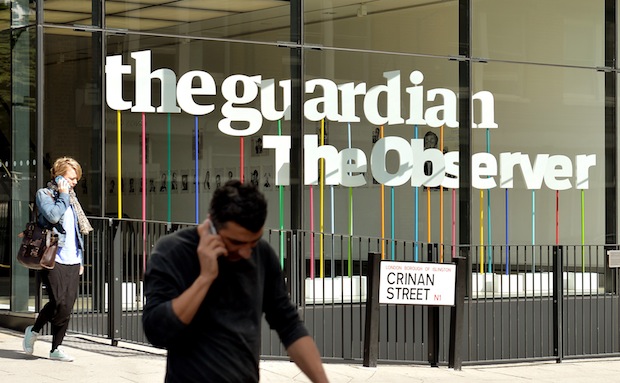The Guardian is a great newspaper and it remains so even if, puzzlingly, more than a fifth of its workforce – both editorial and commercial – appear to think there is something appalling about working for a newspaper.
That is the first and most glaring conclusion to be drawn from the extraordinary letter signed by 338 Guardian and Observer employees lamenting the paper’s willingness to run a column written by the great Suzanne Moore earlier this week, in which Moore argued that “we have gone through the looking-glass and are being told that sex is a construct” and that “you either protect women’s rights as sex-based or you don’t protect them at all”.
The signatories to the letter sent to Kath Viner, the paper’s editor, deplore what they deem the Guardian’s “pattern of publishing transphobic content” though, vexingly, the letter itself provides no evidence of this alleged transphobia and instead merely assumes it. According to Buzzfeed News which received a copy of the complaint – as, doubtless, was intended all along – staff at the paper were “deeply distressed” by the resignation of a transgender employee earlier this week who had, allegedly, received or overheard what are described as “anti-trans comments” from “influential editorial staff”. No details of what these remarks may have been has been furnished by Buzzfeed.
Again, according to Buzzfeed’s account, this all followed what is described as “a series of pieces that pitted trans people against women and against women’s rights”. One editorial column even had the temerity to argue that trans rights are sometimes in “collision” with more orthodox interpretations of women’s rights.
It is suggested that this is a “transphobic” position for the paper to hold though even an elementary appraisal of reality is sufficient to demonstrate that it is an obviously true interpretation of the matter. If there were no collision, or at any rate no widely-shared suspicion of there being a collision, between trans rights and women’s rights there would be no argument on this subject at all. The truth of the Guardian’s editorial position is confirmed by the dispute over it.
And there really are obvious areas where there is such a “collision”. One such is the question of where to incarcerate trans criminals. At present, some transwomen are held in women’s prisons and some in men’s jails. That indicates that these matters are, for now anyway, subject to testing on an individual basis.
The example of Karen White is a case in point. In 2018, the then 52-year old woman with a penis – a statement that remains startling to have to use – was placed in a women’s prison despite having previous convictions for indecent assault, indecent exposure and gross indecency involving children. She subsequently sexually assaulted a female inmate and then, later, admitted to having raped two women before she was sent to prison.
Karen White, who identified as a woman, might have a right to be in a women’s prison but, as surely seems obvious, female prisoners also had a right to be protected from Karen White, no matter her self-identification. There is a pretty hefty and pretty obvious “collision” here and it takes a wilful blindness not to see it. An extreme case? Perhaps. But not one that can be wished away either. What does “trans equality” actually mean in instances such as this?
The letter sent by the 338 horrified Guardian employees states that “we are disappointed” by the paper’s “repeated decision to publish anti-trans views” and it is impossible not to conclude from this that the signatories believe Suzanne Moore’s column should not have been published.
Moreover, it is heavily implied that were Moore – or anyone else – to write a column making an argument deemed – by a process unknown – “anti-trans” it should not be published either. Publishing Moore’s column has, after all, “interfered with our work” and “cemented our reputation as a publication hostile to trans rights and trans employees”. This will be news, I think, to many of the women who have concerns about the way in which the Guardian has covered the controversy over proposed reforms to the 2004 Gender Recognition Act.
Those reforms, which would have introduced self-identification of gender and elided – to put it kindly – the distinction between gender and sex, have for the time being been jettisoned in England. They remain alive in Scotland, however, where a Scottish government consultation on the subject closes later this month.
In January, Nicola Sturgeon, whose ministry supports self-ID, told the Scottish parliament it was vital to “allow a proper debate” to “convince those who have concerns about the issue that there is not a tension and inevitable conflict between women’s rights and trans rights”. But, as I wrote in The Times on Tuesday, the first minister’s remarks give the game away. For if trans-rights and women’s rights were, as some claim, indistinguishable there would be no need to refer to them as distinct entities. Some “collision”, as the Guardian might put it, between them may, from time to time, be impossible to avoid.
This, then, seems a test for Kath Viner and the Guardian. The evident implication of the letter sent by the disappointed 338 is that the paper should cease publishing opinions with which some Guardian employees might disagree. A question arises, then: should the Guardian remain a newspaper at all? It is difficult to avoid the thought that 338 of its employees think it should not. As it is, many of them appear shocked by the discovery they have inadvertently wandered into a workplace in which they may discover a range of views. Perhaps they should reconsider their positions.
A newspaper, particularly a great newspaper such as the Guardian, cannot afford to be an exercise in groupthink. Many of its employees evidently disagree; equally evidently they seem to be of the view that Suzanne Moore should not be permitted to speak her mind within the Guardian’s pages. The Guardian, the great newspaper of liberal England, cannot have room for Suzanne Moore. She must be driven out or otherwise made to feel this is a hostile environment and this must serve as a warning for others. Witches are for burning, after all.
As I say, this is a test of the paper’s liberal credentials. Will Suzanne Moore be hounded out? Will the paper’s editor be bullied by her own “disappointed” staff? Does the paper have, forgive me, the cojones to be the paper it can, should, and must be?
I’d like to think that if I were Kath Viner I would say ‘I stand with Suzanne Moore’ and I would ask her to write a column for Monday’s paper. And I would publish it on the front-page.
Got something to add? Join the discussion and comment below.
Get 10 issues for just $10
Subscribe to The Spectator Australia today for the next 10 magazine issues, plus full online access, for just $10.





















Comments
Don't miss out
Join the conversation with other Spectator Australia readers. Subscribe to leave a comment.
SUBSCRIBEAlready a subscriber? Log in